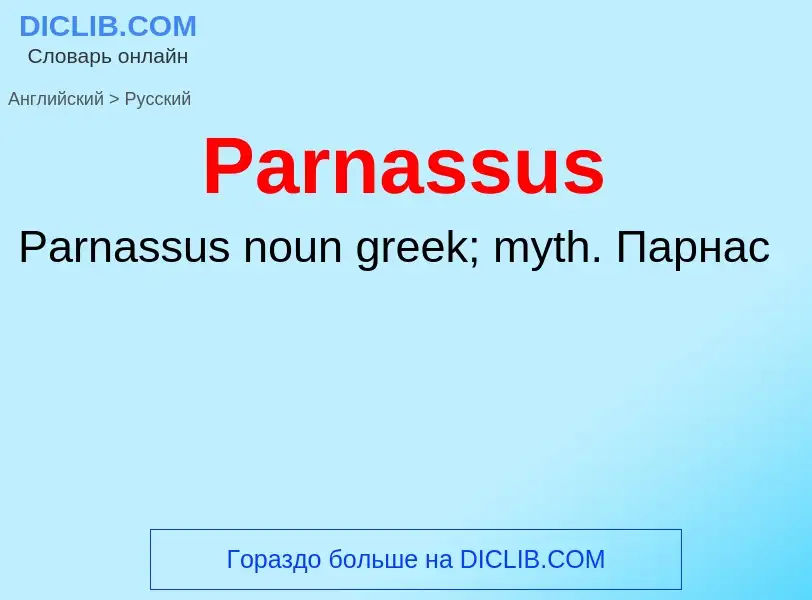Traducción y análisis de palabras por inteligencia artificial ChatGPT
En esta página puede obtener un análisis detallado de una palabra o frase, producido utilizando la mejor tecnología de inteligencia artificial hasta la fecha:
- cómo se usa la palabra
- frecuencia de uso
- se utiliza con más frecuencia en el habla oral o escrita
- opciones de traducción
- ejemplos de uso (varias frases con traducción)
- etimología
Parnassus - traducción al Inglés
[pɑ:'næsəs]
существительное
общая лексика
поэзия
поэты
география
Парнас (гора)
мифология
Парнас
ботаника
белозор (Parnassia)
Definición
Wikipedia

Mount Parnassus (; Greek: Παρνασσός, Parnassós) is a mountain range of central Greece that is and historically has been especially valuable to the Greek nation and the earlier Greek city-states for many reasons. In peace, it offers scenic views of the countryside, being a major international recreational site, with views of montane landscapes. Economically its rolling foothills and valleys host extensive groves of olive, a cash crop marketed world-wide since prehistory. The mountain is also the location of historical, archaeological, and other cultural sites, such as Delphi perched on the southern slopes of the mountain in a rift valley north of the Gulf of Corinth. Parnassus is laced with trails for hiking in the three warm seasons. In the winter the entire range is open to skiing, especially from the resorts of Arachova. Its melting snows are a source of municipal water to the surrounding communities. The mountain is composed of limestone, but also contains bauxite aluminum ore, which is mined and processed. In war, Parnassus has been a center of resistance if need be, providing cover and refuge to partisans.
Parnassus is mentioned in early Ancient Greek literature. Many of its ancient communities are cited in Homer's Iliad. From a linguistic point of view, it was home to states of the Dorians, such as the Phokians, who spoke a Doric dialect, Phokian. According to Greek mythology, this mountain was sacred to Dionysus and the Dionysian mysteries; it was also sacred to Apollo and the Corycian nymphs, and it was the home of the Muses.
However, there is a significant gap in the proto-history of the name, Parnassos. Mycenaean settlements were abundant to the south and east. They had good views of Parnassus, and climbed some part of it frequently, and yet the name remains unattested in what is known of their language, Mycenaean Greek, which is written in Linear B script.


![Entrance to the [[Corycian Cave]] Entrance to the [[Corycian Cave]]](https://commons.wikimedia.org/wiki/Special:FilePath/Corykian Cave, exterior, Kori10.jpg?width=200)
![Painting of Mount Parnassus from [[Edward Dodwell]]'s ''Views in Greece'' Painting of Mount Parnassus from [[Edward Dodwell]]'s ''Views in Greece''](https://commons.wikimedia.org/wiki/Special:FilePath/Parnassus Dodwell.jpg?width=200)


